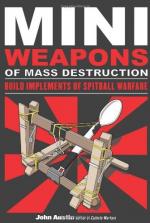|
This section contains 1,473 words (approx. 5 pages at 300 words per page) |

|
Weapons of mass destruction (WMD) are weapons whose destructive power can result in the deaths of thousands of people with a single use. They include nuclear, biological, and chemical weapons (NBCs). By their very nature, WMD are indiscriminate in their destructive effect, and their use violates two of the basic elements of the laws of war: discrimination (making a distinction between combatants and noncombatants), and proportionality (destructive power must be proportionate to legitimate military objectives and targets).
Because of these characteristics, a number of treaties have been established to control the production and use of WMD. The first such treaty was the Geneva Convention of 1925, which prohibited the use of chemical and biological weapons in warfare. The Biological Warfare Convention (1975) and the Chemical Weapons Convention (1992) go beyond prohibiting the use of biological and chemical weapons and call for the complete elimination of...
|
This section contains 1,473 words (approx. 5 pages at 300 words per page) |

|


